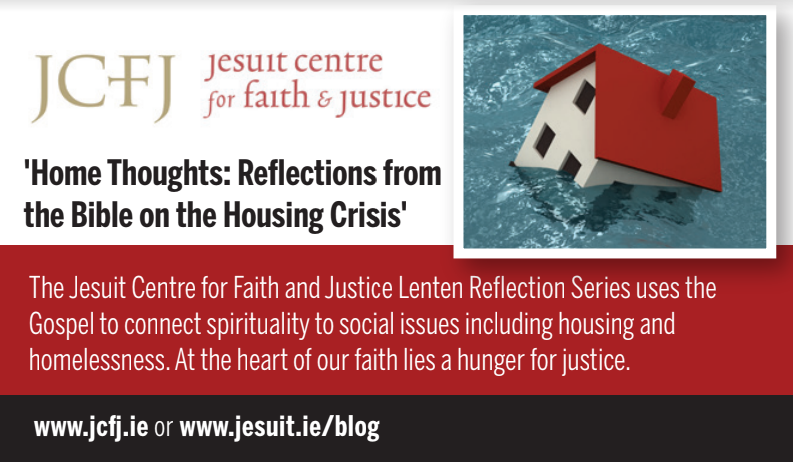
The introduction to our 2018 Lenten Reflections series, by Dr Kevin Hargaden asks that as we spiritually prepare ourselves for the celebration of Easter, we do not express our spirituality as a withdrawal from the complexities of our life into some imagined, hidden, private space where we can feel things are simple again.
The story the Bible tells begins with the making of home. Scholars often note how Genesis 1 and 2 depict God crafting an ordered universe out of chaos as a sort of palace garden, a place where he can dwell in harmony with his creatures.
The story of the Bible ends with the making of home. Scholars often note how the final two chapters of the Bible recapitulate the first two; in Revelation 21 and 22, God fulfils his original ambition. In Revelation 21:3 we read: “Look! God’s dwelling-place is now among the people, and he will dwell with them. They will be his people, and God himself will be with them and be their God.”
The story in between tells the long and twisting road out of the Garden of Eden towards the City of God. Framed in this fashion, the Bible is a story about finding home, but it primarily concerns dislocation, disorientation and displacement. To describe our Scriptures as the search for home is to admit that we are homeless.
The relevance of this reading for our contemporary society should be immediately evident. Based on recent Government figures, there are 5,508 homeless adults in our country, and 1,408 families experiencing homelessness. The scale of these figures regularly shock us and the response to the charitable appeals run by frontline organisations like the Peter McVerry Trust demonstrate that there is a real desire to see this tragedy addressed.
But charitable appeals, on their own, cannot remedy a systematic injustice. Christians can often lament at this point in their ethical musings and throw their hands up in despair about how complex everything becomes. How do we connect our hunger for justice with the reality on the streets? What role does our faith play in informing how we spend our money, time and votes?
Lent is a time when we spiritually prepare ourselves for the celebration of Easter. But if we are honest with ourselves, too often our spirituality expresses itself as a form of escapism, a withdrawal from the complexities and compromises of our life into some imagined, hidden, private space where we can feel things are simple again. Christian spirituality ought never to accept such diluted wisdom. The gospel is not merely an invitation to private consolation, but a provocation to public agitation. As the great Swiss theologian Karl Barth taught, “prayer is the beginning of an uprising against the disorder of this world.”
Spirituality, therefore, authenticates itself when it gains traction exactly in those complex moments of ethical deliberation, like when we are confronted with how to respond as individuals to so massive and sprawling a problem as the Irish housing crisis. If it is true that the Scriptures tell us a story of dislocation and disorientation, then our Scriptures are the exact right place to bed in and make our dwelling. Thinking along with this ancient wisdom, we will find fresh vision for our contemporary society.
This Lent, we propose to re-read the ancient story of Israel in the light of contemporary Ireland’s housing problem. Through Jesus, God prepares a room for us all. But this deep consolation – which is the heart of Easter – is never an invitation to hollow piety. The one who prepares us a home was himself homeless. This is a theme shot through the biblical narrative, unmissable in each of the significant moments.
Reflecting on these Scriptural passages in the Ireland of 2018 is an opportunity for true worship – a devotion that inspires action for the sake of justice. By reading our ancient sacred texts, we are enabled to read the signs of our times. The housing crisis was not fated; it is the product of choices, of political commitments and policy decisions. It is a question of justice that demands a response from those who follow Jesus. We begin to make that response by bringing the heart-sickness we feel from this crisis into contact with God’s Word, open to the Spirit using it to surprise us, shock us, and summons us to action.
Over the coming weeks, we will take a closer look at hinge moments in the biblical narrative where this search for home is most evident. We will reflect on what it means for our personal spiritual life and our shared social life. We will take Lent as a time to quest for home.
Kevin Hargaden, 2018
{fastsocialshare}

